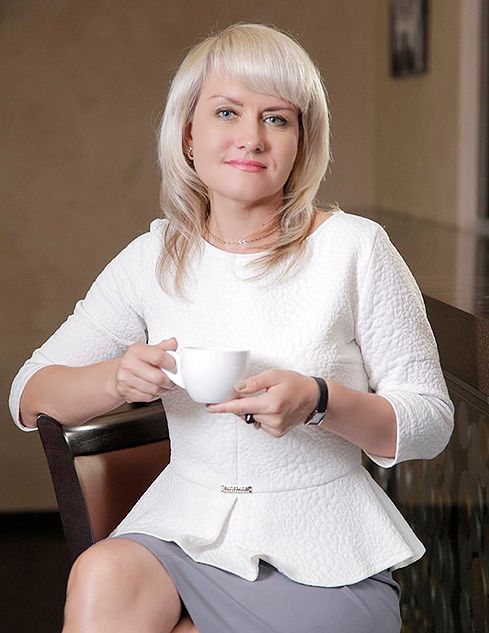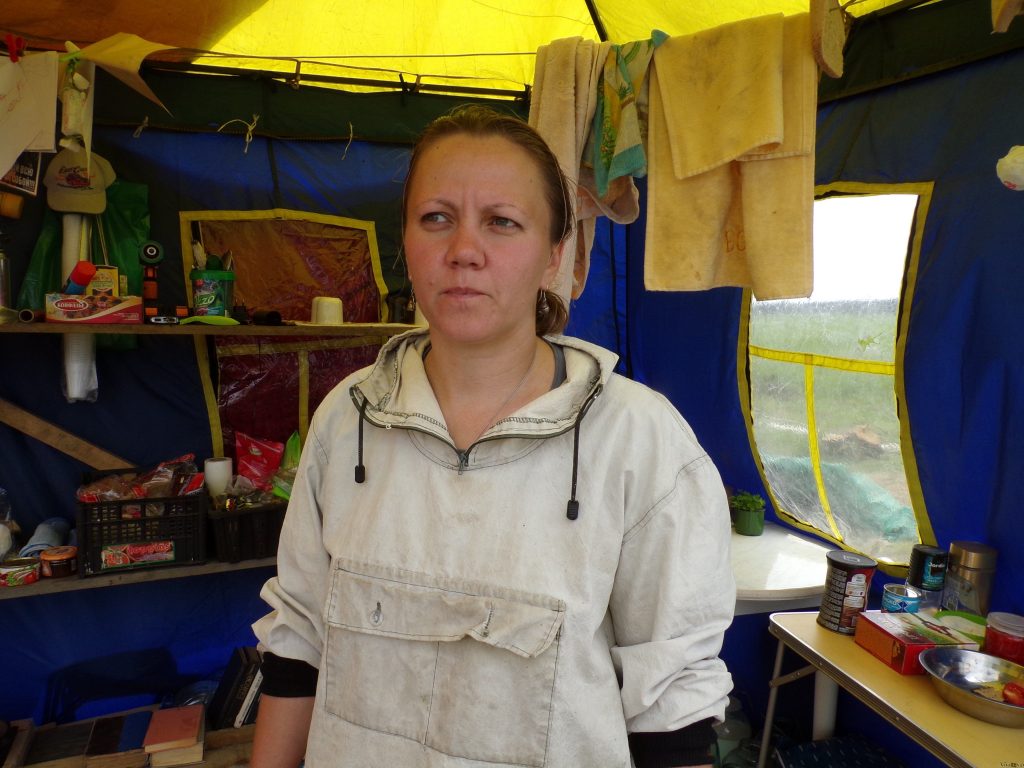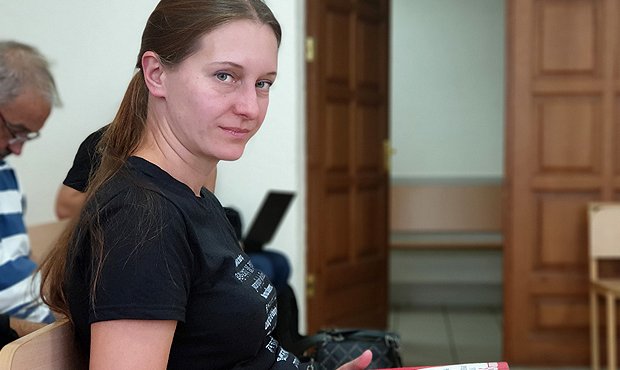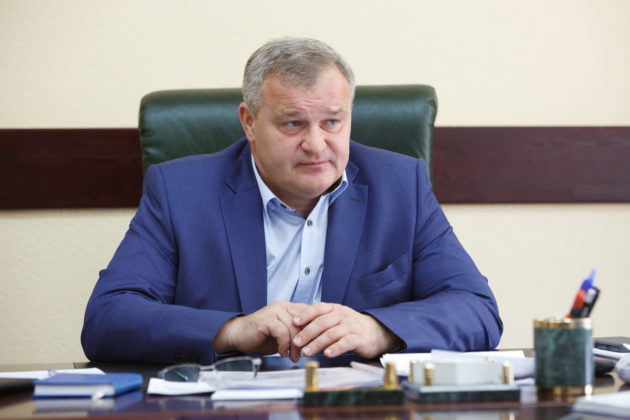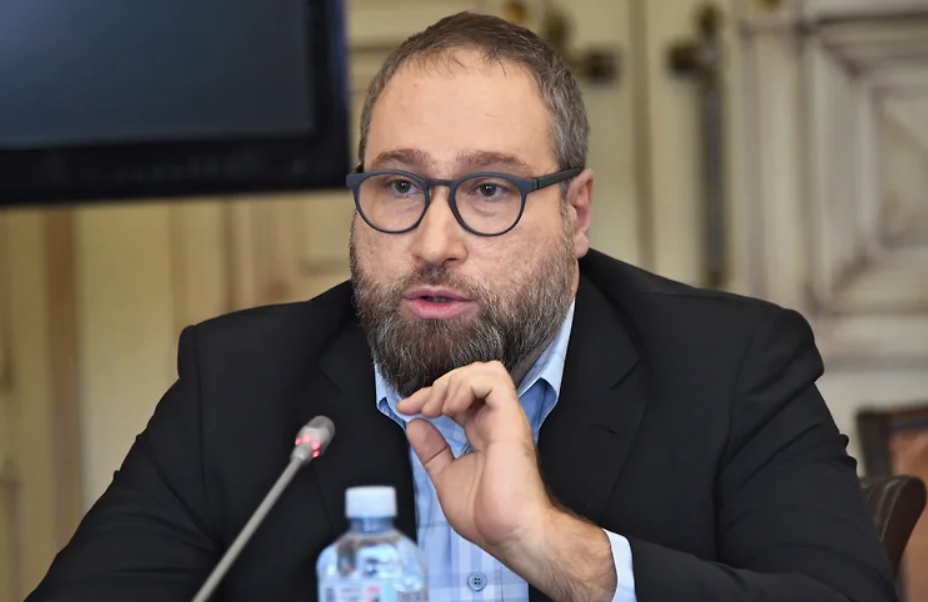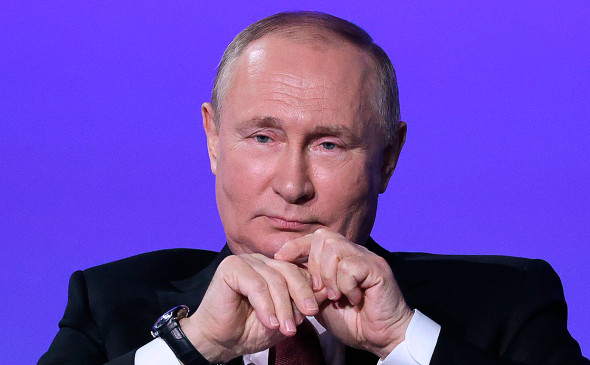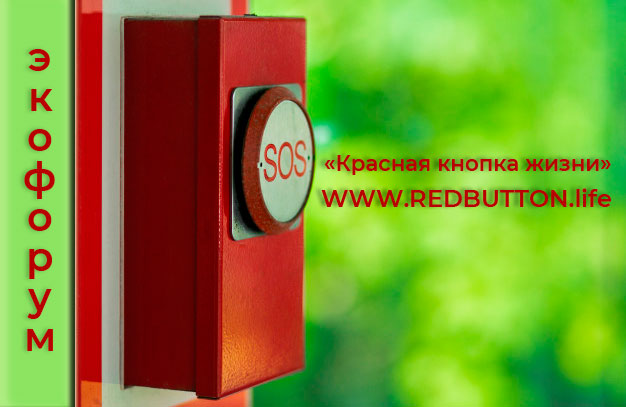Environmental activist Yevgenia Pruss was charged with anti-Semitism and fined. Journalist Svetlana Prokopyeva was fined and added to the list of “terrorists and extremists.” The court expert in both cases was Olga Yakotsuts (INN 190104110270). Those who have read Yakotsuts’s expert reports have just one question for her, “You have a degree in psychology, no kidding?” because it is hard to believe.
Journalist Prokopyeva’s text, in which Svetlana, shall we say, speculated on certain aspects of terrorism in contemporary Russia, was sent for psychological and linguistic expertise. For some unfathomable reason, the court sent the text to Consortsium, a tiny private company based in Abakan, the capital of the Khakassia Republic, a remote Siberian region, despite the fact that the Center for Forensic Examinations of the Ministry of Justice in Moscow exists for exactly such purposes.
Olga Yakotsuts
Even before an expert report was ready, the journalist was sued again—this time for the protection of honor and dignity in the amount of 500,000 rubles (USD 6,670). Olga Yakotsuts, the CEO and only employee of Consortsium, filed a lawsuit because she was offended by Ms. Prokopyeva’s post on Facebook, in which the journalist predicted that the expert report would find her guilty. Surprisingly (in contemporary Russia), the court sided with the defendant and rejected the lawsuit. However, the journalist’s prediction proved to be correct, no surprises here.
Since Ms. Yakotsuts filed a lawsuit against the journalist, the defense filed a motion to dismiss Yakotsuts as the expert. The court rejected the motion.
By that time, Ms. Yakotsuts had worked as an expert in several scandalous cases. She was an expert in the case of Khakassia activist Lidia Bainova, who was added to the extremist list for saying, “Nationalism in Abakan is sickening.” Also, she was an expert in the case of another Khakassia resident, Artyom Yurchenko, who published caricatures of the Russian Orthodox Church patriarch and for this was added to the extremist list (eventually the defendant was acquitted).
The main activity of the limited liability company run by Olga Yakotsuts is forensic expertise. Lawyers in Khakassia refer to Ms. Yakotsuts as a “full-time expert on extremism.”
Interestingly, Ms. Yakotsuts named her company Consortsium (or Consortium), i.e. a business community, although she is the only employee there. However, let’s not pick on the expert’s linguistic weaknesses, which occasionally play a cruel joke on her.
The Jewish Question, or the Case of Yevgenia Pruss
Yevgenia Pruss is an environmentalist from Khakassia, a hiking and climbing coach. Most of 2020 was a good and fruitful year for Ms. Pruss until the Center for Combating Extremism, a.k.a. Center E, quite unexpectedly charged her with posting anti-Semitic videos. It turned out that she had added several videos to her VKontakte social network account to watch later, while hiking. The incident leaked to the media and social networks. The local Jewish community learned about the questionable videos and filed a complaint.
Olga Yakotsuts was appointed as a linguistic and psychological expert in the case. We do not envy her. After all, she had to watch and get the grip of really crazy videos about the Illuminati, the world government, and something called the “genetic perception disorders” that allegedly occur after circumcision.
The linguistic part of the study was nothing short of pitiful. To illustrate, we will quote just one sentence from Ms. Yakotsuts’s report for the reader to try and understand its meaning:
To this end, Jews are either placed in the system of power of a country or they are formed into “political kikes,” who destroy power from within, which forms hostile attitudes towards Jews, including from the Russian people “Beat the kikes—that’s all there is to it,” then it can lead to protests against the arbitrariness of the “kike government / objectionable managers,” that is, the people themselves overthrow the “objectionable government,” hatred is accumulating among the people to smash the elite.
The expert’s chaotic thought, complete with equally chaotic punctuation, obscures the meaning. The psychological part of the expert report is more clear. It states that the “videos reek of all the colors of anti-Semitism and chauvinism,” and that the “creators [of the videos] are obviously sympathetic to Hitler” and, therefore, they themselves do not deserve any sympathy.
A real expert linguist, Dr. Irina Tazmina, Candidate of Philological Sciences (equivalent to a PhD degree), who once was Ms. Yakotsuts’s professor at the university, had objections to the linguistic part of the report. Dr. Tazmina pointed out that the report had “no methodological basis of a linguistic research” and described the conclusions of the report as “unmotivated, controversial, and questionable.”
During a court hearing, Yevgenia Pruss explained that she despised anti-Semitism and she herself was Jewish. However, the court sided with the expert report by Olga Yakotsuts—despite the bad style, numerous mistakes, and absence of any scientific methodology in her report—and fined Pruss 10,000 rubles (USD 133). The court dismissed the defense’s argument that Pruss had no intention to disseminate those videos or her opinions of them. The defense attorney, Ayas Tyundeshev, vouched to appeal to the European Court of Human Rights.
Yevgenia Pruss
Memoirs of a Terrorist, or the Case of Svetlana Prokopyeva
After a 17-year-old anarchist perpetrated a terrorist attack in the reception room of the Federal Security Service (FSB) in Arkhangelsk Oblast, journalist Prokopyeva opined that the government must share some responsibility for the incident.
An investigation was launched to determine whether or not Ms. Prokopyeva “justified terrorism.” Six out of eight experts described her remarks as extremist. However, their reports were harshly criticized by some other linguists who found the arguments unconvincing and unscientific. The court decided to conduct one last linguistic examination of Ms. Prokopyeva’s text at the other end of the country—in Khakassia. The Prokopyeva case became Olga Yakotsuts’s “15 minutes of glory.”
On her Facebook account, Ms. Prokopyeva predicted that the result of the expertise would not be in her favor. Several days later, expert Yakotsuts sued her, demanding to remove the Facebook post that “discredited the honor, dignity, and business reputation of a citizen,” and to pay for moral damage. Ms. Yakotsuts’s complaint, like all her texts, was written in a bad style and riddled with spelling errors.
The journalist’s prediction turned out to be correct. Ms. Yakotsuts’s expert report was not in her favor. It was also quite predictable that the psychological and linguistic arguments of the so-called expert would be lame, and the report would be written in a bad style and, generally, refute the common sense.
The expert report on the Yevgenia Pruss case contained no linguistic methods at all. In the Prokopyeva case, Yakotsuts twisted facts and used linguistic methods to serve her agenda.
In Prokopyeva’s opinion, the young man, due to his upbringing and lack of civil society mechanisms, saw a terrorist attack as the only possible way to protest. Ms. Yakotsuts concluded that the journalist had justified terrorism.
Speaking on a radio show, journalist Prokopyeva said, “That guy was born and raised in Putin’s Russia and did not see any other way [other than a terrorist attack] to convey to society his protest against fabrication of criminal cases.” Ms. Yakotsuts concluded that the journalist was propagating terrorist attacks as a way of protest.
The expert report asserted that any attempts to understand terrorists’ motives support terrorism. Based on the expert report, the prosecution requested for journalist Prokopyeva six years in prison.
Some pro-government media outlets in Khakassia described Ms. Yakotsuts as the “most qualified expert” in Russia.
Svetlana Prokopyeva
At a press conference, Olga Yakotsuts in her wisdom advised journalists to “express such opinions only at home on a couch and share them only with your friends and family.” Having thus clarified her approach to journalism, Ms. Yakotsuts continued, “I, for one, have absolutely no motivation to use the Internet.” For young adults who want changes, Ms. Yakotsuts had a recipe, too. “[M]ake concrete steps: join a political party, work with government officials, and eventually you will attain your goals and reach your full potential.”
Ms. Yakotsuts said that writing the expert report in the Prokopyeva case was “not at all difficult.” We showed Ms. Yakotsuts’s report on “justification of terrorism” to several experienced linguistic experts and they were invariably amazed at her incompetence.
According to Dr. Irina Tazmina, her former student Ms. Yakotsuts managed to draw opposite conclusions on the basis of the same speech patterns. “In one case, [Yakotsuts] finds [in the text] linguistic markers of national and racial superiority, and in another the same markers [allegedly] signify humiliation of human dignity.”
Ms. Yakotsuts identified terrorist, terrorist, and bomb as the key words in Prokopyeva’s text. Other experts, however, pointed out that the journalists discussed the role of the government (state), which was the key concept in the text.
Ms. Yakotsuts alleged that journalist Prokopyeva had justified the crime, conveniently overlooking the epithet “heinous” in the text. How could anyone justify a crime describing it as heinous?
Ms. Yakotsuts confused inclinations of Russian verbs, made a phonological expertise which was not part of the requested work, repeatedly mixed up the words—and the motivation behind them—of the terrorist and the journalist. Ms. Yakotsuts accused journalist Prokopyeva of an “emotional and civil response to the incident” and of "posting [her opinion piece] in text and audio formats with the aim to transmit [it] to mass reader and listener.” To summarize, Ms. Yakotsuts accused Ms. Prokopyeva of … being a journalist! Then again, we remember what Ms. Yakotsuts advised journalists, right? In her opinion, journalists can either whisper sitting on a couch at home or work in alliance with the government.
The criticism of the government clearly irritated Ms. Yakotsuts. She did not like the part about fabrication of criminal cases and torture practiced by the Russian law enforcement agencies. Ms. Yakotsuts regarded the phrase “… there are no conditions for political activism in Russia” as an attack on existing values.
And what are Ms. Yakotsuts’s values? In an interview, she said, “Don’t rock the boat. Don’t get yourself worked up and write things on the Internet [you may later regret].” She added that she had joined the All-Russian People’s Front to become a public figure. [Translator’s note: The All-Russia People’s Front was started in 2011 by then-Prime Minister of Russia Vladimir Putin with the aim to be a formal alliance between the ruling United Russia party and numerous Russian NGOs.]
Having made dozens of questionable conclusions in her report, Ms. Yakotsuts was close to sending the journalist to prison for several years—simply because she considers any public protest unacceptable.
Nationalism Sucks, or the Case of Lidia Bainova
Lidia Bainova
A champion of Khakass culture, Lydia Bainova, became yet another victim of Ms. Yakotsuts for her emotional post about the rise of nationalism and the oppression of the Khakass language. Ms. Bainova criticized the authorities for their indifference to the problem and wrote, “Nationalism in Abakan is sickening.” With her usual shrewdness and verbal dexterity, psychologist and linguist Yakotsuts concluded, quote, “Bainova believes that today there is a drastic necessity to revive the Khakass language using various methods, including the threat of violence, both against the Khakass population. And the Government of the Republic” (we preserved the punctuation of the original text).
Olga Yakotsuts: Profile of an Expert Who Is No Expert
Olga Yakotsuts has a degree in teaching Russian language and literature, which is hard to believe when we read her texts, and a Candidate of Sciences (PhD) degree in psychology. To become a court expert, she took a 144-hour course in “Forensic Linguistics.”
Interestingly, until 2020 the Consortsium company had nothing to do with courts and expert reports but specialized in providing social services to the elderly and the disabled. A cheap-looking website describes the company as the “only professional association of psychologists in Abakan.” Truth be told, the association consists of just two psychologists, one of whom is Yakotsuts herself. A one-person company run by the “most qualified expert in the country,” Consortsium has several times failed to pay taxes, and in 2019 bailiffs collected debts three times.



